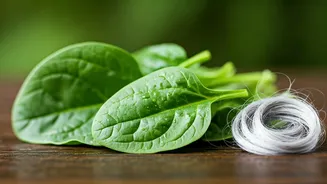Nutrient Power: Unveiled
Premature greying hair can be caused by various factors, including genetics, stress, and nutrient deficiencies. Addressing these deficiencies through proper
nutrition is key to managing this concern. The first nutrient is Vitamin B12, crucial for red blood cell formation, which carries oxygen to hair follicles. A lack of Vitamin B12 can lead to premature greying. You can incorporate Vitamin B12 by consuming foods like meat, fish, eggs, and dairy products. Individuals following vegetarian or vegan diets might need to consider B12 supplements to ensure adequate intake. Next up is Vitamin D, which plays a vital role in hair follicle cycling. Vitamin D deficiency is associated with hair loss and premature greying. Increasing your Vitamin D intake can be achieved through sun exposure, consuming foods fortified with Vitamin D, and taking supplements. Aim to get sufficient sunlight and incorporate these foods into your diet to ensure proper levels.
The Role of Minerals
Beyond vitamins, minerals also play crucial roles. Iron is essential for carrying oxygen to hair follicles, supporting hair growth and pigmentation. Iron deficiency can contribute to premature greying. Incorporate iron-rich foods like spinach, lentils, and red meat into your diet. Zinc is also a vital mineral. It's a key player in hair tissue growth and repair, playing an important role in how your hair grows and remains healthy. Zinc deficiency has been linked to hair loss and changes in hair color. To up your zinc intake, eat zinc-rich foods like nuts, seeds, and whole grains. Selenium is another critical mineral, with antioxidant properties that protect cells from damage. It promotes a healthy scalp and supports hair growth. You can increase selenium consumption through foods like Brazil nuts and seafood. Maintaining a balanced intake of these minerals, along with a healthy diet, is crucial for preserving your hair's natural color and promoting overall hair health.
Antioxidants: The Defenders
Oxidative stress, caused by free radicals, contributes to hair greying. Antioxidants help combat this damage. One of the best antioxidants is Vitamin E, which protects hair follicles from oxidative stress. It is found in nuts, seeds, and vegetable oils. Another key is Vitamin C, which assists with collagen production, which is essential for healthy hair. Vitamin C-rich foods include citrus fruits and bell peppers. Consuming foods with high levels of antioxidants can help keep your hair healthy and delay the appearance of grey hairs. This is done by protecting hair follicles from oxidative damage, contributing to a longer-lasting, more vibrant hair color. Make sure to integrate antioxidant-rich foods into your daily routine to combat the aging process and maintain healthy hair.
Lifestyle and Hydration
Besides nutrition, certain lifestyle choices and maintaining adequate hydration also play roles in hair health. Drink plenty of water to ensure your hair follicles are properly hydrated, which promotes healthy hair growth. Reducing stress through techniques like meditation or yoga can also help. High stress levels can lead to premature greying, so stress management is important. Getting enough sleep supports overall health and hair health. Aim for 7-8 hours of quality sleep each night. Consider incorporating these lifestyle changes to maximize the effectiveness of the nutrients you are consuming. These changes contribute significantly to overall hair health and assist in delaying the appearance of grey hair. Consistent healthy habits, alongside a balanced diet, maximize your chances of having healthy hair.
Dietary Integration
Incorporate the previously mentioned nutrients into a well-rounded diet. Focus on whole foods like fruits, vegetables, lean proteins, and whole grains. For example, include spinach and lentils for iron, nuts and seeds for zinc and selenium, and citrus fruits for Vitamin C. Supplementing may be necessary if you have any deficiencies. Before starting any supplements, consider consulting with a healthcare professional to identify your specific nutritional needs and ensure you select the appropriate supplements. Tailoring your diet to include nutrient-rich foods is the most effective way to ensure your body receives the necessary building blocks for healthy hair. Combining these dietary approaches with lifestyle changes can significantly impact the health of your hair.















